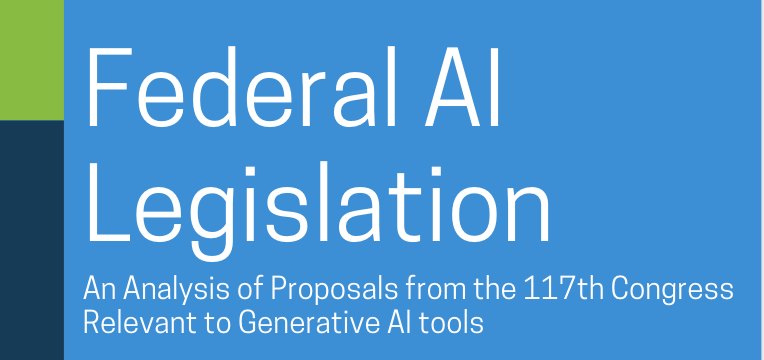Anna Lenhart has started a new document tracking 118th proposals, the Google doc was exported on October 24th and is available for crowdsourced input.
The following report is an analysis based on a list of “federal legislative proposals pertaining to generative AI” first circulated as a Google Document on April 12, 2023. In the weeks that followed current and former hill staffers that cover technology policy contributed to the list. This report aims to glean and summarize trends in recent proposals addressing risks from generative AI tools, while highlighting areas for further considerations.
The list began as a response to a narrative perpetuated by the media suggesting that Congress has yet to propose legislation “to protect individuals or thwart the development of A.I.’s potentially dangerous aspects.”[1] This narrative fails to recognize the wide range of proposals written that aim to govern the processing of data, including the generative AI tools currently capturing the nation’s imagination.
For the sake of this analysis, I considered the definition of generative AI to be "a subset of artificial intelligence algorithms that are used to create new content based on patterns in large amounts of existing content" including chatbots such as ChatGPT, video synthesis and image generators such as DALL-E, both as standalone tools or integrated into information technology (search engines, email, productivity tools, etc). [2] A primary part of this analysis is understanding which definitions of covered platforms/covered entities include generative AI tools. The bills included for analysis represent “proposals” from the 117th Congress, as they did not make it to the President’s desk and have not been subject to legal interpretations in a court of law. The interpretations below represent best understanding based on congressional intent. Each section includes a summary of the proposals and considerations for Congress as bills are considered for reintroduction.
To reasonably scope the analysis, I focused on a specific subset of risks posed by generative AI tools: opacity and market power, discrimination, disclosure of personal information, manipulation, creation and proliferation of harmful content. There are several other policy portfolios in Congress that address concerns from generative AI that fell outside the scope of this analysis (intellectual property, semiconductor supply chain, media literacy, financial services, workforce, national security).
Additionally, I limited the analysis to bills introduced during the 117th Congress (2021-2022) at the federal level. Fortunately other organizations have trackers for international and state legislation, as seen on the next page.
Read the full report.


